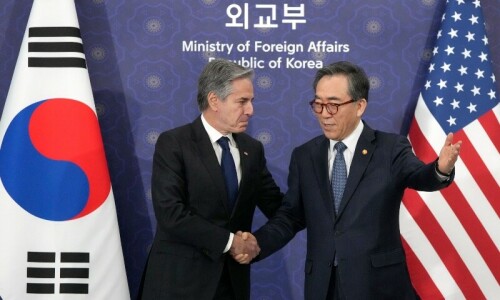 Why has the value of the Pakistani stock market dropped precipitously over the last several months? Why has so much capital flown out of the market and why has some of it gone out of the country? There is flight of capital emanating not only from foreign investors.
Why has the value of the Pakistani stock market dropped precipitously over the last several months? Why has so much capital flown out of the market and why has some of it gone out of the country? There is flight of capital emanating not only from foreign investors.
Pakistani capital is also leaving the country. Why is there such a state of panic in the capital and financial markets?
Will these conditions prevail for some time to come or will there be a return of the happier days that defined the mood of the markets for a couple of years? After all, Pakistan’s stock markets were considered to be among the top performers in the world, not only just among the emerging economies. Will they return to that state some time in the future? What kind of policy actions need to be taken to restore some confidence in the markets?
These questions have several answers. The most obvious one is that the investors have lost confidence in the future of the Pakistani economy because of political uncertainty.
The current plunge began in mid April. On April 18, the KSE-100 index reached 15,676; since then it has fallen by more than 31 per cent. The fall began a month into the assumption of power by the elected representatives of the people.
It appears that the markets gave some time to the new policymakers to settle down in their jobs and begin to lay down the direction in which they wished to take the economy. The investors began to lose heart when it became clear that Islamabad was in disarray.
Stock markets, after all, reflect how investors view the future of the economy. It is not easy to be confident that the country’s economy will achieve much if some of the political issues that continue to draw so much of the attention of the policy makers away from economic management don’t get resolved quickly.
Pakistan, having experienced political stability for almost seven years – from October 1999 when General Musharraf took control of the country to March 2007 when he decided to remove the Chief Justice of the Supreme Court – is going through a period of turmoil unprecedented even when measured against the standards of its turbulent history.
We know from the experience of many countries across the globe that nothing troubles markets more than uncertainty. That has been established by the empirical work done at many development and financial institutions. There are good reasons why that is the case. Investors make assumptions about the environment in which they are operating. Sudden changes alter the calculations they have made. When a great deal of capital moved into Pakistan’s stock markets, there was an assumption that the policies adopted by the state over half a dozen years would continue even if there was a change of personnel among the ranks of senior policymakers. That has not happened.
While what can be called the “Musharrafian” model of economic management has not been replaced by anything different, what has happened is a policy vacuum. That of course is highly troubling for the community of investors.
While the explanation based on political developments for Pakistan’s stock market woes holds a lot of water, there are other reasons also that have put pressure on the performance of the bourse. As can be seen from the accompanying table, Pakistan is not the only country that has suffered a major set back in the value of its stock markets. There are several other countries that are in a similar situation.
There are seven countries that have seen the value of their stock markets decline by more than 30 per cent in 2008. The company in which Pakistan finds itself includes four developed countries, three of them European. It also includes China and India, the mega-economies of the developing world that have been growing rapidly for the last several decades.
There are very large countries in the group (China and India) and very small ones (Ireland and Portugal). There are those that have managed their economies extremely well (Ireland, China and India) and those that have not done so well in terms of economic management (Pakistan).
Pakistan is the only country in this group that has had to deal with extreme domestic political difficulties. For other countries other than political factors were responsible. Two of these also apply to Pakistan. All the countries that have seen sharp adjustments in the stock markets experienced booms in stock prices in the previous twelve months.
Booms are always caused by speculation and speculative behaviour was much in evidence in all the poorly performing markets of 2008. Speculators were bidding for different reasons. Ireland, having outpaced the countries of the European Union, was seen as the leading economy in the area. It seemed a good idea to bet on it.
China and India were regarded as the new growth centres of the global economy. It seemed a good idea to invest in their capital markets. Portugal was regarded as a catch-up economy somewhat like Spain that has overtaken some of the more established European economies.
In Pakistan’s case, speculative behaviour had a multiple of causes including a fiscal system that did not punish speculation (Pakistan is one of the few large economies that does not tax capital gains), it is physically close to a number of countries with large amounts of investible capital, there was an impression that the country may have finally found a way of climbing on to the trajectory of growth taken by a number of large Asian economies. It also seemed like a good investment bet.
The countries that experienced sharp capital markets adjustments are all highly dependent on imported oil. As the price of oil increased and reached almost $150 a barrel, these countries came under an extraordinary amount of stress. This has eased a bit as oil prices have begun to climb back from the record levels achieved a few weeks ago.
We can conclude from this brief analysis that the sharp fall in equity prices of the stocks included in the KSE-100 index is not entirely the consequence of the political uncertainty that prevails in Pakistan at this time.
To the political pressures playing on the market we should also add factors such as the perceptions about the country’s medium-term economic prospects, fiscal and other policies that allow speculation, and the increase in the price of oil that has severely affected the state of the economy. Given that, what is that policymakers can do?
Some actions are being contemplated such as persuading cash rich companies to buy back their shares, adopting legislation that would lead to the de-mutualisation of the ownership of the stock markets, and holding back on the changes in the fiscal stance to discourage speculation.
The first would bring temporary relief, the second will introduce a structural change that will help the operations of the market in the long run, and the third would retain a seriously distorting element in the way the country has been managing the economy.
Ultimately it is the level of confidence in the country’s economic future that will stabilise the capital markets. This can only happen once the operators in the markets are persuaded that policymaking positions in Islamabad are occupied by those who have the competence as well as the authority to take actions that will revive the economy. If that were to happen, capital will flow back into the markets. As shown in the table, the yield, at seven per cent, available in the Pakistani market is the highest among those countries that are experiencing falls in equity prices. This level of yield will bring capital back once confidence returns.










































Dear visitor, the comments section is undergoing an overhaul and will return soon.